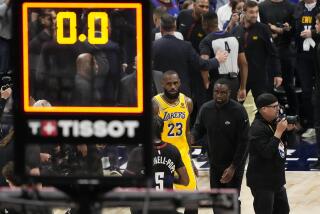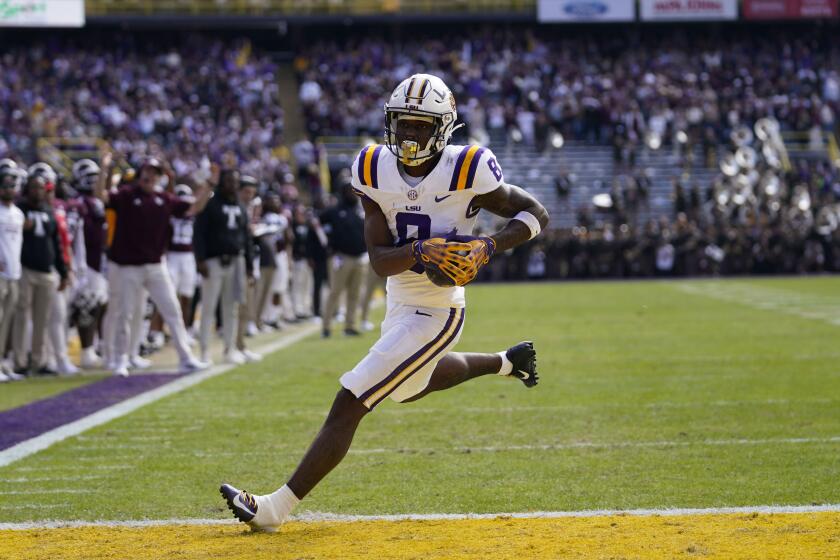Clock ticking on rule changes
Two controversial rules, 3-2-5 and 3-2-5-e, will be reviewed next year and probably altered in the aftermath of a college football season that pitted coaches in complicated games of beat the clock.
“My educated guess would be there would be a change,” said Grant Teaff, executive director of the American Football Coaches Assn.
The Football Rules Committee put in the changes this season to help speed up games that were often three hours or more.
Rule 3-2-5 dictated that the clock start when the ball is free kicked and rule 3-2-5-e, the more controversial, ordered that, after a possession change, the clock would start on the officials’ ready-for-play signal.
The rules had a significant impact on speed of play and drew harsh criticism from many of the game’s high-profile coaches.
“I don’t know many coaches that are too happy with” the new rules, said Florida State Coach Bobby Bowden. “They’re trying to speed the game up. All they’re speeding up are [coaching] firings.”
At one point this year, Florida Coach Urban Meyer characterized the rule change as “awful.”
Oregon Coach Mike Bellotti told The Times, “It’s the most dramatic, drastic change I’ve seen. Nobody likes it.”
Bellotti made those comments before the season.
Texas Coach Mack Brown complained after his team’s Sept. 9 loss to No. 1 Ohio State that the new clock rules made it more difficult for a trailing team to mount a fourth-quarter comeback.
“They [the Buckeyes] scored with six minutes left and the game was over before we had a chance to do anything,” Brown said on a conference call after that game. “... I hate it.”
USC Coach Pete Carroll, who didn’t want instant replay in college football, thinks the clock rule has to be changed.
“I don’t like it,” Carroll said. “I don’t like it and I think we made a mistake here with this rule and I think we should fix it.” The rules influenced length of games and coaching strategy.
According to College Football Stats, a website that monitored the clock rules’ impact, the average game time decreased from 3 hours 20 minutes 22 seconds in 2005 to 3:06:33 this year.
The average number of plays per game fell, from 168 to 152, while scoring decreased from 52.44 points to 47.37.
Game times fluctuated wildly from conference to conference. The average Mountain West Conference game was 26:06 shorter than last year, yet the Sun Belt Conference lost an average of only 4:18 a game.
The rule changes made coaches rethink how to use their allotted three timeouts per half.
It could be argued that the changes contributed to Arizona State Coach Dirk Koetter’s losing his job.
With his team trailing USC by seven points in the fourth quarter, Koetter elected to punt on fourth and 22 from his 23-yard line with virtually no chance of getting the ball back other than a USC turnover.
USC took possession of the ball at its 31 with 1:19 to play, and Arizona State had to use one of two remaining timeouts just to keep the clock from starting. The Trojans then simply ran out the clock.
Carroll could argue the new rule contributed to his team’s failure to win a berth in the national-championship game.
Consider:
Trailing, 13-9, against UCLA on Dec. 2, USC had three timeouts remaining and 1:10 left on the clock when UCLA’s Eric McNeal made his dramatic interception of John David Booty’s pass at the UCLA 20.
Under the new clock rule, however, Carroll was forced to use one of his timeouts immediately to keep the clock from starting.
“We had to use that timeout right then and it would have been of great value to us later in the game,” Carroll said.
USC used its final two timeouts after UCLA ran plays and forced the Bruins to punt. But USC got the ball back with only four seconds left and failed on a Hail Mary attempt.
The rule changes even had an impact on sportsmanship.
Joe Paterno was furious as he ran off the field at halftime of the Penn State-Wisconsin game after Badgers Coach Bret Bielema purposely ordered his team to run offside twice on kickoffs in order to run off the last 23 seconds of the game clock.
Officials could have called an unsportsmanlike conduct penalty on Wisconsin but did not.
So what happens to the rules now?
The AFCA last month mailed clock-rule surveys to all coaches.
Teaff said that, contrary to published reports, many coaches didn’t have a problem with the changes, especially defensive coaches.
“It was very interesting,” Teaff said of the survey. “The coaches were pretty well split on it.”
The issue will be a hot topic at January’s AFCA convention in San Antonio, where the coaches will forward any clock-rule recommendations to the Football Rules Committee.
Conventional wisdom suggests there will be a proposal to amend the rules, perhaps reverting to the old clock rules in the final two minutes of each half.
Any changes would be made by the Football Rules Committee, which convenes February in Albuquerque, N.M.
“We knew it would not be a something-for-nothing exchange,” Michael Clark, coach at Division III Bridgewater (Va.) College and chairman of the Football Rules Committee, said of the changes. “But at the same time we need to review some of the consequences of this change.”
Clark hinted that a change to this rule change may be coming.
“Although a 3-hour-40-minute game is not in anyone’s best interest and the clock will always be a factor, in tight games it should not cheat the players and fans,” Clark said. “This is the dominant issue on the committee’s agenda and we will address it properly.”
*
Times staff writer Gary Klein contributed to this report.
More to Read
Get our high school sports newsletter
Prep Rally is devoted to the SoCal high school sports experience, bringing you scores, stories and a behind-the-scenes look at what makes prep sports so popular.
You may occasionally receive promotional content from the Los Angeles Times.







